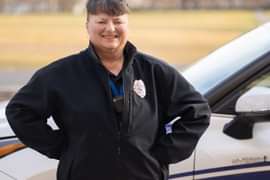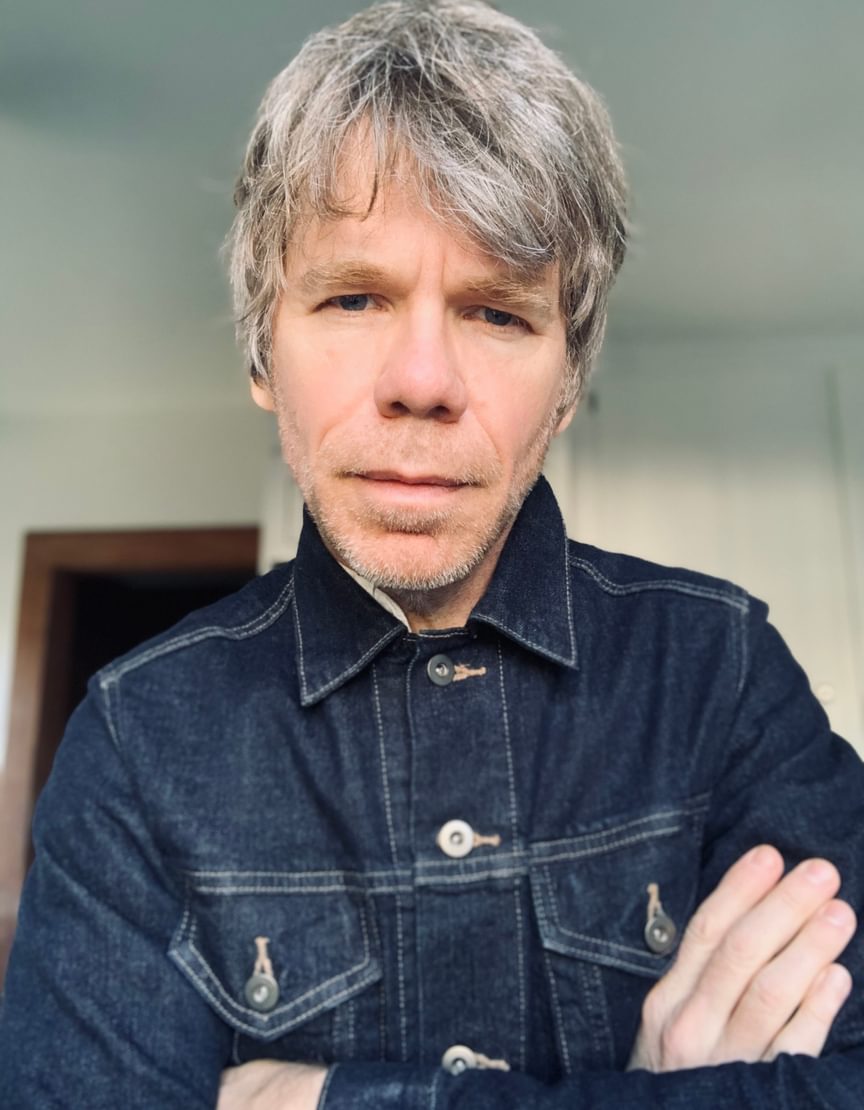
August 24, 2021
A family affair
Dan ’79 and Warren Zanes ’83 on their lives in musicby Jennifer Myers & Rita Savard
In the 1980s, the Zane brothers were living the dream of every kid who spends hours alone with an electric guitar—touring in a rock and roll band. Guitarist and singer Dan (center, above), along with Warren on guitar (left, above), bassist Tom Lloyd ’79, and Steve Morrell on drums, formed the Del Fuegos. The popular Boston-based band was named “Best New Band” by Rolling Stone magazine in 1984. After releasing four albums and two hit singles, “Don’t Run Wild” and “I Still Want You,” the band called it quits in 1991. But for Dan and Warren, it marked the beginning of long and impactful careers in the music industry.
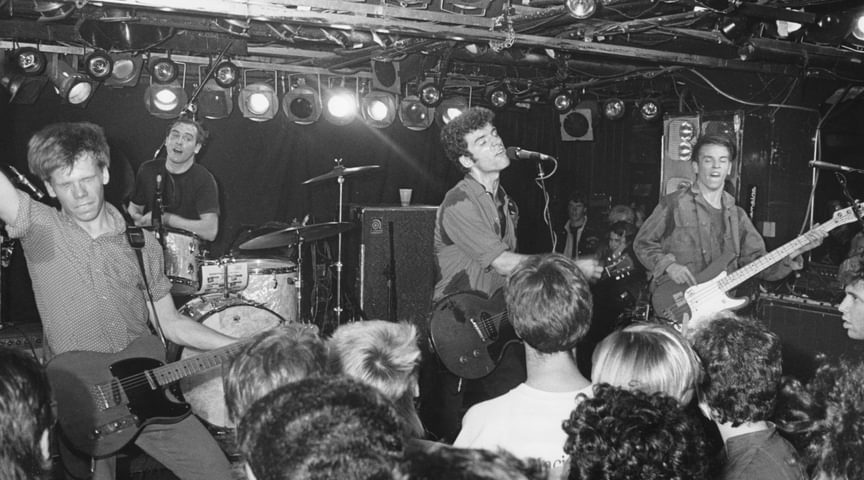
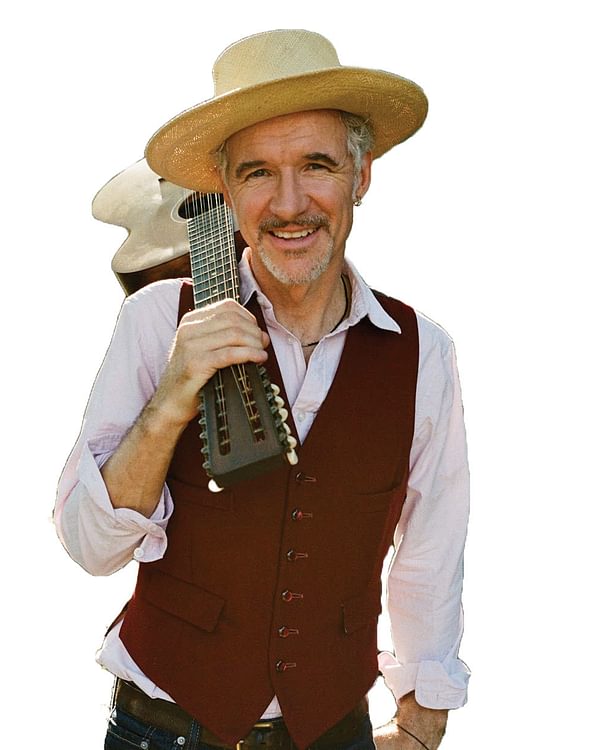 Photo courtesy of danandclaudia.com
Photo courtesy of danandclaudia.com
Dan Zanes ’79
After becoming a dad, Dan thought the music being marketed to children could be better, so he decided to do something about it. Starting in his Brooklyn neighborhood, he put together a multiracial group and began creating fun music the whole family could enjoy. In 2007, Dan Zane and Friends won a Grammy Award for their album Catch That Train.
Today, Dan and his wife perform as the family-friendly folk duo Dan and Claudia Zanes. Their new album, Let Love Be Your Guide, will drop in September. “It’s the best record I’ve ever been part of in my life,” says Dan.
How did the Del Fuegos start?
I went to Oberlin College, specifically looking to start a band. I grew up in New Hampshire where it was difficult to find like-minded people. On the first day, I saw Tom Lloyd standing in the line for breakfast. I recognized him from Andover even though we didn’t know each other when we were classmates there. We recognized each other; we ate breakfast, then went up to my room and hung out and decided we would start a band. Tom and I played together for the next 10 years. If it weren’t for Tom, I don’t know if I’d be alive today. He was such a rock for me creatively and emotionally.
You quickly dropped out of Oberlin to come back to Boston and get the band off the ground. How did that go over with your parents?
My mother was a bohemian, so she was good with it.
What’s the best thing about your job?
That my wife and I do it together. I knew the day I met her she was the person I had been looking for my entire life. To see how the world has embraced us has been incredible; that I can have this new chapter and the new chapter is the best chapter—who gets to say that? I’ve been blessed to be able to play with incredible people all along. I had the rock and roll experience with Tom Lloyd and now the family music experience for many years with an amazing group of musicians.
What inspires you creatively?
We come from a long line of folk musicians here in America and in Haiti, where Claudia’s family is from. It is expected that the folk musicians will sing about what’s going on. The internal landscape as well as the events of the world.
How has your work evolved from the early days with the Del Fuegos, then performing family music with Dan Zane and Friends, to now with what you are doing with Claudia?
I look back at the old days and thank God that I was able to get out of there alive. There was a lot of drugs and alcohol involved so I’m super grateful to be alive. Everyone I knew wanted to be doing exactly what I was lucky enough to be doing, which was making records and touring. We weren’t the best band in the world, but we were in the right place at the right time. Family music was very liberating for me creatively. There was so much more I could do and I could write about. Most of the time I was playing family music, I was playing with a multiracial group of men and women—a group like that is very rare in this world. It’s a beautiful thing; you can make music that way you just can’t make any other way because people are bringing so many fresh perspectives to the music. Claudia and I are the next step in that journey.
How did the pandemic affect your work?
“We went 200 days in a row of putting out a video of a different song every day. And along the way, especially after the [murder] of George Floyd, we were not always able to find a song that expressed what we wanted to say. We started to write quickly to reflect what was going on directly around us. Sometimes it feels like we can be a little musical newspaper. And in everything else that’s going on, sometimes there is a feeling that there is still joy on the air. People are together, people are rediscovering community, old folks are looking at young folks and telling stories. There is just the joy of the human experience. It’s a full spectrum of emotions that we get to express through music.”
What are you listening to/reading/binge watching at the moment; what do you recommend?
Listening to a lot of Lizz Wright and the Indigo Girls. They’re pretty awesome. We try to watch documentaries, especially around racial justice. That Raoul Peck series, Exterminate All the Brutes was pretty great.
What did you learn at Andover that still benefits you today?
I’m so grateful for my experience in Andover. I learned by making mistakes socially. I was navigating so much social stuff at Andover and doing a pretty terrible job at it. I learned a lot and came out of it with a better sense of myself.
What is your advice for an Andover student who is just beginning to explore the arts?
If you are white, figure out how what anti-racism means to you. If you can’t figure that out, everything will be more of a true possibility. Be nice to people. Learn how to hang out. And take care of your teeth.
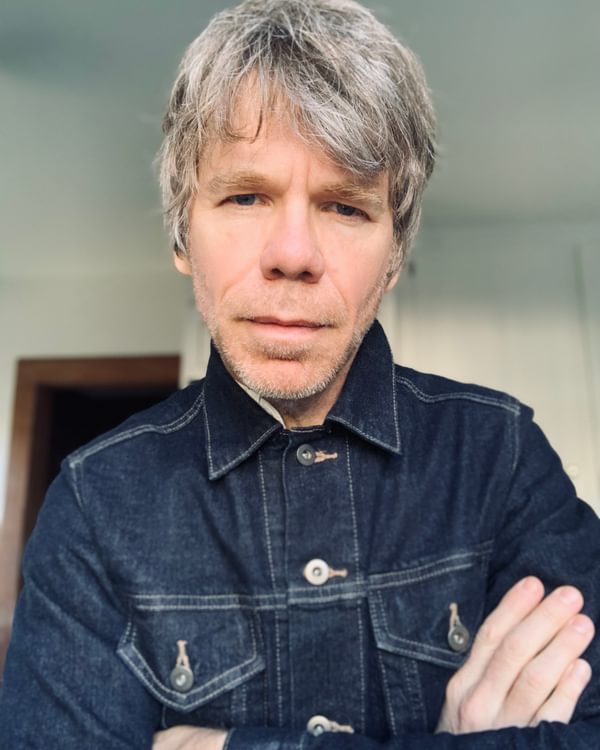 Photo by Piero Zanes
Photo by Piero Zanes
Warren Zanes ’83
From rock star to bike mechanic to earning a PhD, Warren’s journey—much like his writing—is filled with hidden corners and inspiring truths. He has released three solo albums, was the vice president of educational programs for the Rock and Roll Hall of Fame, the past executive director of Little Steven Van Zandt’s Rock and Roll Forever Foundation, and is a Grammy-nominated documentary producer. He is also a New York Times best-selling author whose books include Dusty in Memphis, Revolutions in Sound: Fifty Years of Warner Bros. Records, and Petty: The Biography. He teaches classes on popular music at New York University.
How did you start playing music?
In rock and roll culture—and folk, blues, gospel, hip hop, a lot of popular forms—it’s difficult to separate the playing from the listening. One minute you’re driving the car, turning up the volume because the Faces “Ooh La La” has come on, and the next thing you know you’re beating on the steering wheel and singing a good-enough harmony. Different from, say, classical traditions, rock and roll is a culture with a very thin wall between listening and active participation. You fall in love with a recording, play it so many times that your roommate starts looking for another place to live, and, finally, you just want to get inside of that song, to feel what it’s like in there. So, you learn the chords, try to get the lyrics right, and now you’re playing it. From a rock and roll perspective, playing is nothing more than the ultimate listening experience. The music that got me started didn’t check credentials at the door. It wasn’t perfectly democratic, but it was as close to that as I’d ever experienced. The requirement for participation was as simple as having to stay awake, which I was able to do on many occasions.
What was the strongest influence you had when you were growing up?
There’s a remarkable book written by RZA of the Wu-Tang Clan, The Tao of Wu. There’s a lot to learn from it about hip hop, about race in America, about creation. But one of the most striking lessons is in the way the RZA takes in culture. He’s influenced by kung fu movies, fables his uncle tells him, cartoons, the Bible. It’s a wide range of unlike things. What got me, though, was that he doesn’t assign value to these influences. Meaning, the Bible doesn’t stand any higher than the cartoon. The value of a cultural artifact relates only to what it can do for him to help him navigate his life. I feel like he gave me a way to understand my own experience. The stuff that mattered the most to me, that shaped me, wasn’t always considered to be of a high cultural quality. I’d love to tell you that I took in a steady diet of great Russian novels, conceptual art, and atonal music. But it wasn’t so. I loved The Adventures of Robin Hood—the television series. The movie Breaking Away affected me deeply. I was still reading Encyclopedia Brown books when the other kids had moved on. I loved Motown records. At the same time, I looked at Diane Arbus photographs a lot, trying to understand what the hell was going on there. Mostly, I was just trying to figure out how to get into my own skin, and anything that helped me do that mattered.
Where did you go to college?
As I tell my sons, Lucian and Piero, don’t assume you’ll get as lucky as dad did. I have a doctorate and teach at NYU, but I never actually applied to an undergraduate institution. I just kind of showed up at Loyola University in New Orleans, and they never told me to go away. Maybe they were too polite. But I was 23 when I got into my first college classroom, so that suggests a particular trajectory, right? My college counselor at Andover, Robin Crawford—maybe because he realized I hadn’t filled out any applications—suggested that joining my brother’s rock and roll band, the Del Fuegos, made a certain kind of sense. Things were out of order, in my world and in my mind. But it worked. That’s the luck part.
What was your 'aha' moment when you chose to pursue music as a career path?
The very term “career path” suggests a kind of reasoned approach to a working life. I have enormous respect for those who do what they set out to do, but I’m not among that group. I’ve been dogged by good fortune. If I’m to be credited with anything, it’s with working even when I didn’t know why. That meant writing when there was no audience, taking a class on the French novel when old friends were in Los Angeles having hit records. It’s not that I had faith, not then. It’s just that I kept working and life got around to me. A day finally came when the Gods said, “What shall we do with Zanes?” You know? Weather the disappointments and just keep working. The “aha” moments might only be recognized as “aha” moments in retrospect.
The value of a cultural artifact relates only to what it can do for him to help him navigate his life. I feel like he gave me a way to understand my own experience. The stuff that mattered the most to me, that shaped me, wasn’t always considered to be of a high cultural quality.
”Where do you look for inspiration?
The time-tested places: love, trouble, the prisons we build for ourselves and others. I’ve made a mess of things in my life more than once. The aim is to avoid repetition and see if I can get a few songs out of it along the way. But it goes beyond songs. I try to let my emotional life affect whatever I’m working on. Most of the time, it can’t be traced. But it’s in there.
What is your most important tool—something you can't live without in your creative process?
Probably my main guitar, which is a 1947 Gibson LG2. Whatever I’m working on, it’s close by.
Who is your musical hero and why?
My dormmates in Stuart and Nathan Hale knew then that I loved Tom Petty. They were doing their homework while I was listening to Damn the Torpedoes and Long After Dark. When grades were posted in GW Hall, at first I thought they were listed alphabetically. They weren’t. Truth? My cluster dean twice sent letters home recommending I not return to Andover. I wasn’t a great student in the traditional sense. I just wanted to listen to records and sneak out at night. Not a recipe for success. But—and this may sound absurd—I think I was affected by Andover’s learning environment, even if it seemed I was leaving the learning part to others. I listened to my Tom Petty records and kept listening to them. I listened to them like my roommate studied for History 35. I listened because I loved the sound of those guitars, because I thought he understood me, because he made me feel like there was some kind of freedom out there to be had. And maybe because I was in a learning environment, I wanted to learn why Tom Petty had that effect on me. I thought about Tom Petty for a long time. Then, one day many years later, I found myself standing in Petty’s driveway in Malibu, talking to him, and he asked me if I’d be interested in writing his biography. That’s the good luck part. Turns out I’d been preparing for the job for some time. And it will remain a centerpiece in my life.
What are you working on now?
I’m just finishing a book about Bruce Springsteen’s Nebraska album. A high point during the pandemic was having the chance to spend time with Springsteen, to talk about that recording, its strangeness, its moment in Reagan’s America, its moment in Springsteen’s personal life, its austere quality. I also finished a third book with Garth Brooks for his Anthology series. These guys are two giants in American music. Both performed as part of Biden’s inauguration, simply because—I believe—they are voices that have meant a great deal in American culture. I can’t begin to tell you how much I’ve learned from both. Bruce, I grew up with, hearing his music all the time. Garth, I discovered. And I think I’ve learned as much from him about songs and what music does for us as I have from anyone. He’s the biggest selling solo artist in the history of popular music, and it didn’t happen by accident.
What is the best thing about your job?
That I can share it with my sons. And they can then affect my viewpoint. And maybe I can mess with theirs a little.
What is your advice for an Andover student who is just beginning to explore the arts?
Try out as many forms/mediums as you can in as uninhibited a way as is possible. Paint, write, make films, cartoons, play drums, make stained glass, whatever. Some practices may end up hobbies, some careers, some private places that are little more than a diary in a different shape. But work in one medium may be the very thing that makes work in another medium great. Wait as long as you can before you begin to limit your territory.
What did you learn at Andover that still benefits you today?
I had a teacher at Andover named Ward Just. Only a week ago, I was standing in my kitchen reading some old letters he’d written to me. We’d stayed in touch, and he wrote a stunning piece for the Rock and Roll Forever Foundation about being in Saigon during the Vietnam War, filing a story for the Washington Post from his hotel room, and hearing The Supremes singing “I Hear a Symphony” on Armed Forces radio. The connections he made in a short bit of writing—without ever forcing the connections—are remarkable. Anyway, at Andover I wrote something for Ward, a long, rambling, self-involved thing, and he said the magic words: “I like the part about Elvis.” What? I thought he’d tell me to scrap that section. It was a quiet moment that found a place in me and then, over time, grew into something that was, for me, crucial. Elvis matters. Aretha Franklin matters. Kanye West matters. The high culture/low culture divide is a construction. Take that sucker down.
A big part of my life has involved bringing popular music into the classroom, whether in middle school or graduate school. Popular music is an enormous part of our lives, yet it’s been sitting outside the classroom, waiting patiently, as we come to our senses. In my past work as a VP at the Rock and Roll Hall of Fame, as executive director of The Rock and Roll Forever Foundation, and now teaching at NYU, I’m just doing what Ward Just told me I could do. There he was, in Bulfinch Hall, an unfiltered Camel hanging from his lips, taking Elvis seriously. Man, that was heavy stuff for me.





